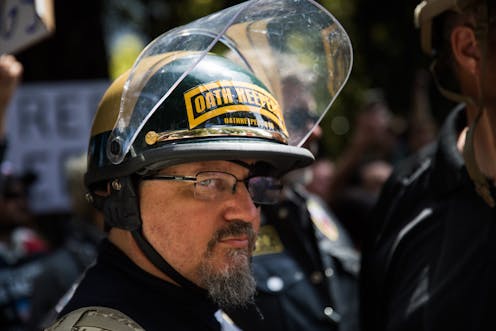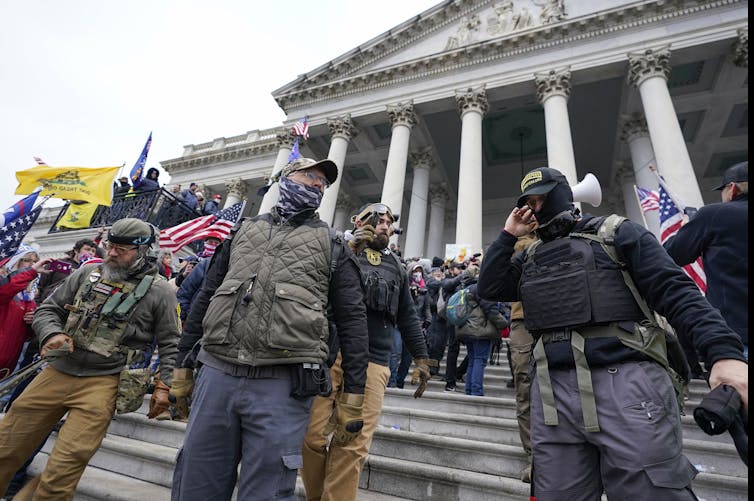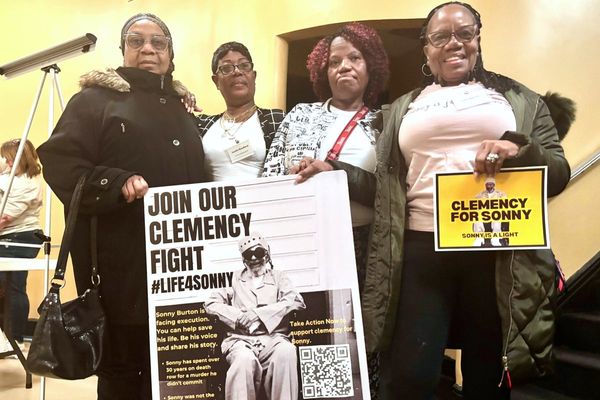
Stewart Rhodes, the founder of the Oath Keepers, was sentenced to 18 years in prison on May 25, 2023, in the wake of his November 2022 conviction for seditious conspiracy. Rhodes led an effort to keep former President Donald Trump in office after Trump lost the 2020 presidential election, including planning violence at the U.S. Capitol on Jan. 6, 2021.
Several scholars of right-wing movements, white nationalism and extremism have written articles explaining what the Oath Keepers and groups like them want, and how they work – as well as the limits on their free-speech rights to talk about violent overthrow of the U.S. government. Here we spotlight four examples of those scholars’ work.
1. Oath Keepers are violently anti-government
“Oath Keepers have participated in several armed standoffs against the government,” wrote criminologists Matthew Valasik of the University of Alabama and Shannon Reid of the University of North Carolina – Charlotte.
For instance, “In 2014, the Oath Keepers joined an armed standoff between far-right patriot groups in Nevada on behalf of Cliven Bundy. In 2015, Oath Keepers showed up heavily armed in Ferguson, Missouri, during protests over the killing of Michael Brown. And in 2016, Oath Keepers were present at the armed takeover of the Malheur National Wildlife Refuge in Oregon.”
2. Oath Keepers are looking for a fight
At the Jan. 6 insurrection, the Oath Keepers contingent was looking to overthrow the government, wrote Sara Kamali, a scholar of systemic racism at the University of California, Santa Barbara, and the author of “Homegrown Hate: Why White Nationalists and Militant Islamists Are Waging War against the United States.”
Testifying before the congressional committee investigating the insurrection, “former Oath Keepers spokesman Jason Van Tatenhove left little doubt about the intentions of the white nationalist militia group when its members stormed the U.S. Capitol on Jan. 6, 2021,” Kamali wrote.
“Tatenhove explained that Jan. 6 ‘could have been a spark that started a new civil war,’” she continued.

3. Many Oath Keepers are former military personnel
The Oath Keepers – who “may number in the thousands” – are a threat in part “because the Oath Keepers actively recruit current and retired members of the armed forces,” wrote Mia Bloom and Sophia Moskalenko, Georgia State University scholars of violent extremism.
They reported that “[a]bout 10% of the Oath Keepers are active-duty military, and around two-thirds are retired military or law enforcement,” and that “[s]everal Oath Keepers present at the Jan. 6 attack were veterans,” some of whom used a military formation to breach the Capitol.
In addition, a growing number of military personnel are involved in domestic terrorism, and an increasing number of extremists have military ties, Bloom and Moskalenko reported.
4. The First Amendment does not protect sedition
Those former military members may have taken an oath to protect the U.S. and its Constitution from all enemies, foreign and domestic, but they are finding that constitutional protections go only so far.
“Far-right extremists or other hate groups can claim they are just venting or even fantasizing – both of which would be protected under the First Amendment,” wrote Amy Cooter, a scholar of extremism and militias at Middlebury’s Center on Terrorism, Extremism, and Counterterrorism. “For this reason, seditious conspiracy charges have historically been hard to prosecute.”
Cooter noted that Rhodes did not enter the Capitol on Jan. 6, 2021, but his conviction “suggests that the jury believed that Rhodes’ texts and other communications incited others to violent, undemocratic action in a way that requires accountability.”
Leer más: Oath Keepers convictions shed light on the limits of free speech – and the threat posed by militias
Editor’s note: This story is a roundup of articles from The Conversation’s archives.
This article was originally published on The Conversation. Read the original article.







